A recent planning submission for a new McDonald’s restaurant and drive-thru in Blairgowrie has stirred considerable discussion among residents throughout Perth and Kinross. The proposed £4 million investment, earmarked for a site near a well-known coffee chain off the Perth Road (A93), directly opposite Westpark Retail Park, promises to bring over 120 full and part-time employment opportunities to the area.
However, the announcement has unveiled a sharp divide in local opinion. Many long-time inhabitants express profound concerns about the potential transformation of Blairgowrie’s unique character. They articulate a fear that the town is slowly morphing into a smaller version of Perth, yet without the essential amenities, diverse facilities, or the dedicated green space management seen in the larger city. This sentiment reflects a deeper anxiety about losing the distinct charm that defines Blairgowrie. Environmental and Business Impact Weigh Heavily on Residents
A significant point of contention revolves around the environmental implications of the fast-food establishment. Despite the planning documents outlining provisions for recycling facilities and ample parking, a prevailing worry centres on the inevitable increase in litter. Comments from various Perthshire residents highlight a grim prediction of roadside verges, particularly along the A93, becoming marred by discarded fast-food packaging. They cite existing issues in other regions as a cautionary tale, suggesting that transient traffic passing through Blairgowrie would contribute significantly to this problem without investing in local commerce.
Beyond environmental degradation, local entrepreneurs and community advocates are vocal about the potential economic strain on existing businesses. Many independent cafes and shops, which form the backbone of Blairgowrie’s high street and offer a distinct local flavour, fear that a global giant could siphon off crucial trade. There is a strong appeal for the Perth and Kinross Council to prioritise the welfare of these established enterprises, with some suggesting that the site would be better suited for other types of businesses, perhaps a bakery chain or a popular pizza takeaway, that might complement rather than directly compete with the existing offerings. Diverse Perspectives on Growth and Convenience
Conversely, a segment of the Perthshire community warmly welcomes the proposed development. For these residents, the primary appeal lies in convenience, eliminating the necessity of lengthy drives to other McDonald’s branches currently located in Perth, Dundee, or Forfar. The prospect of a quicker, more accessible option for a popular meal is seen as a practical benefit to daily life.
Moreover, the creation of over 120 new jobs is a compelling argument for those focused on local economic growth. Proponents suggest that the arrival of a major brand like McDonald’s could stimulate further commercial interest in Blairgowrie, potentially attracting other desired amenities. They draw parallels to how the introduction of other large retailers in the area, such as a major supermarket or discount store, has generally been absorbed without leading to the demise of cherished local businesses, asserting that core customers remain loyal to independent establishments. The debate underscores the complex challenge faced by Perth and Kinross Council in balancing development with community identity and environmental preservation.
However, the announcement has unveiled a sharp divide in local opinion. Many long-time inhabitants express profound concerns about the potential transformation of Blairgowrie’s unique character. They articulate a fear that the town is slowly morphing into a smaller version of Perth, yet without the essential amenities, diverse facilities, or the dedicated green space management seen in the larger city. This sentiment reflects a deeper anxiety about losing the distinct charm that defines Blairgowrie. Environmental and Business Impact Weigh Heavily on Residents
A significant point of contention revolves around the environmental implications of the fast-food establishment. Despite the planning documents outlining provisions for recycling facilities and ample parking, a prevailing worry centres on the inevitable increase in litter. Comments from various Perthshire residents highlight a grim prediction of roadside verges, particularly along the A93, becoming marred by discarded fast-food packaging. They cite existing issues in other regions as a cautionary tale, suggesting that transient traffic passing through Blairgowrie would contribute significantly to this problem without investing in local commerce.
Beyond environmental degradation, local entrepreneurs and community advocates are vocal about the potential economic strain on existing businesses. Many independent cafes and shops, which form the backbone of Blairgowrie’s high street and offer a distinct local flavour, fear that a global giant could siphon off crucial trade. There is a strong appeal for the Perth and Kinross Council to prioritise the welfare of these established enterprises, with some suggesting that the site would be better suited for other types of businesses, perhaps a bakery chain or a popular pizza takeaway, that might complement rather than directly compete with the existing offerings. Diverse Perspectives on Growth and Convenience
Conversely, a segment of the Perthshire community warmly welcomes the proposed development. For these residents, the primary appeal lies in convenience, eliminating the necessity of lengthy drives to other McDonald’s branches currently located in Perth, Dundee, or Forfar. The prospect of a quicker, more accessible option for a popular meal is seen as a practical benefit to daily life.
Moreover, the creation of over 120 new jobs is a compelling argument for those focused on local economic growth. Proponents suggest that the arrival of a major brand like McDonald’s could stimulate further commercial interest in Blairgowrie, potentially attracting other desired amenities. They draw parallels to how the introduction of other large retailers in the area, such as a major supermarket or discount store, has generally been absorbed without leading to the demise of cherished local businesses, asserting that core customers remain loyal to independent establishments. The debate underscores the complex challenge faced by Perth and Kinross Council in balancing development with community identity and environmental preservation.


